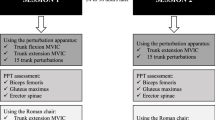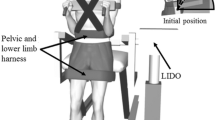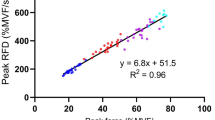Abstract
Purpose
The aim of this study was to evaluate the effects of lumbar muscle delayed-onset muscle soreness (DOMS) on the ability of the trunk muscles to reproduce different levels of force.
Methods
Twenty healthy adults (10 males and 10 females) were recruited for this study. Force reproduction in trunk extension and flexion was assessed at 50 and 75% of participants’ maximal isometric voluntary contraction in flexion and extension before and after a lumbar muscle DOMS protocol. Trunk proprioception was evaluated and compared between these conditions using different variables such as constant errors (CE), absolute errors (AE), variable errors (VE) and time to peak force (TPF). For each variable, repeated measure ANOVAs were conducted.
Results
AE were higher when participants had to reach the target post-DOMS protocol in extension compared to flexion and in the presence of higher demand of force (p = 0.02). For VE, results showed that participants were more variable in extension than in flexion when the required force was higher (p = 0.04). CE variable was higher when participants had to reach the force target in extension compared to flexion under the effect of DOMS (p = 0.02). Results also showed that participants took less time to reach the force target post-DOMS protocol in extension (0.62 ± 0.20 s) and in flexion (0.53 ± 0.19 s) than pre-DOMS protocol in extension (0.55 ± 0.15) and in flexion (0.50 ± 0.20) (p < 0.001).
Conclusion
Lumbar muscle DOMS affects trunk proprioception during force reproduction tasks especially in trunk extension and at higher force.






Similar content being viewed by others
Abbreviations
- DOMS:
-
Delayed-onset muscle soreness
- MVC:
-
Maximum voluntary contraction
- IPAQ:
-
International physical activity questionnaire
- CE:
-
Constant error
- AE:
-
Absolute error
- VE:
-
Variable error
- TPF:
-
Time to peak force
References
Abboud J, Nougarou F, Pagé I, Cantin V, Massicotte D, Descarreaux M (2014) Trunk motor variability in patients with non-specific chronic low back pain. Eur J Appl Physiol 114(12):2645–2654
Abboud J, Rousseau B, Descarreaux M (2018) Trunk proprioception adaptations to creep deformation. Eur J Appl Physiol 118:133–142. https://doi.org/10.1007/s00421-017-3754-2
Abboud J, Lessard A, Piché M, Descarreaux M (2019) Paraspinal muscle function and pain sensitivity following exercise-induced delayed-onset muscle soreness. Eur J Appl Physiol. https://doi.org/10.1007/s00421-019-04117-6
Bartlett R, Wheat J, Robins M (2007) Is movement variability important for sports biomechanists? Sports Biomech 6:224–243. https://doi.org/10.1080/14763140701322994
Bishop MD, Horn ME, George SZ, Robinson ME (2011) Self-reported pain and disability outcomes from an endogenous model of muscular back pain. BMC Musculoskelet Disord 12:35
Boucher JA, Abboud J, Nougarou F, Normand MC, Descarreaux M (2015) The effects of vibration and muscle fatigue on trunk sensorimotor control in low back pain patients. PLoS ONE 10:e0135838. https://doi.org/10.1371/journal.pone.0135838
Cheung K, Hume P, Maxwell L (2003) Delayed onset muscle soreness: treatment strategies and performance factors. Sports Med 33:145–164
Cleak MJ, Eston RG (1992) Delayed onset muscle soreness: mechanisms and management. J Sports Sci 10:325–341. https://doi.org/10.1080/02640419208729932
Coudreuse JM, Dupont P, Nicol C (2004) Delayed post effort muscle soreness. Ann Readapt Med Phys 47:290–298. https://doi.org/10.1016/j.annrmp.2004.05.012
Craig CL et al (2003) International physical activity questionnaire: 12-country reliability and validity. Med Sci Sports Exerc 35:1381–1395. https://doi.org/10.1249/01.Mss.0000078924.61453.Fb
da Silva RA, Lariviere C, Arsenault AB, Nadeau S, Plamondon A (2009) Pelvic stabilization and semisitting position increase the specificity of back exercises. Med Sci Sports Exerc 41:435–443. https://doi.org/10.1249/MSS.0b013e318188446a
della Volpe R, Popa T, Ginanneschi F, Spidalieri R, Mazzocchio R, Rossi A (2006) Changes in coordination of postural control during dynamic stance in chronic low back pain patients. Gait Post 24:349–355. 10.1016/j.gaitpost.2005.10.009
Descarreaux M, Lalonde C, Normand MC (2007) Isometric force parameters and trunk muscle recruitment strategies in a population with low back pain. J Manipul Physiol Ther 30:91–97
Falla D, Gizzi L, Tschapek M, Erlenwein J, Petzke F (2014) Reduced task-induced variations in the distribution of activity across back muscle regions in individuals with low back pain. Pain 155:944–953. https://doi.org/10.1016/j.pain.2014.01.027
Farias-Junior LF et al (2019) Psychological responses, muscle damage, inflammation, and delayed onset muscle soreness to high-intensity interval and moderate-intensity continuous exercise in overweight men. Physiol Behav 199:200–209
Hagert E (2010) Proprioception of the wrist joint: a review of current concepts and possible implications on the rehabilitation of the wrist. J Hand Ther 23:2–17
Hjortskov N, Essendrop M, Skotte J, Fallentin N (2005) The effect of delayed-onset muscle soreness on stretch reflexes in human low back muscles. Scand J Med Sci Sports 15:409–415
Hodges PW, Danneels L (2019) Changes in structure and function of the back muscles in low back pain: different time points observations, and mechanisms. J Orthop Sports Phys Ther 49:464–476. https://doi.org/10.2519/jospt.2019.8827
Hodges PW, Richardson CA (1999) Altered trunk muscle recruitment in people with low back pain with upper limb movement at different speeds. Arch Phys Med Rehabil 80:1005–1012. https://doi.org/10.1016/s0003-9993(99)90052-7
Hodges PW, Tucker K (2011) Moving differently in pain: a new theory to explain the adaptation to pain. Pain 152:S90–98. https://doi.org/10.1016/j.pain.2010.10.020
Jerosch J, Prymka M (1996) Proprioception and joint stability. Knee Surg Sports Traumatol Arthrosc 4:171–179
Karos K, Meulders A, Gatzounis R, Seelen HAM, Geers RPG, Vlaeyen JWS (2017) Fear of pain changes movement: Motor behaviour following the acquisition of pain-related fear. Eur J Pain 21:1432–1442. https://doi.org/10.1002/ejp.1044
Lariviere C, Da Silva RA, Arsenault AB, Nadeau S, Plamondon A, Vadeboncoeur R (2011) Specificity of a back muscle roman chair exercise in healthy and back pain subjects. Med Sci Sports Exerc 43:157–164. https://doi.org/10.1249/MSS.0b013e3181e96388
Larsen LH, Hirata RP, Graven-Nielsen T (2017) Pain-evoked trunk muscle activity changes during fatigue and DOMS. Eur J Pain 21:907–917. https://doi.org/10.1002/ejp.993
Lee AS, Cholewicki J, Reeves NP, Zazulak BT, Mysliwiec LW (2010) Comparison of trunk proprioception between patients with low back pain and healthy controls. Arch Phys Med Rehabil 91:1327–1331
Lee PH, Macfarlane DJ, Lam T, Stewart SM (2011) Validity of the international physical activity questionnaire short form (IPAQ-SF): a systematic review. Int J Behav Nutr Phys Act 8:115
Luu BL, Day BL, Cole JD, Fitzpatrick RC (2011) The fusimotor and reafferent origin of the sense of force and weight. J Physiol 589:3135–3147. https://doi.org/10.1113/jphysiol.2011.208447
MacIntyre DL, Reid WD, McKenzie DC (1995) Delayed muscle soreness. The inflammatory response to muscle injury and its clinical implications. Sports Med 20:24–40
McNair PJ, Heine PJ (1999) Trunk proprioception: enhancement through lumbar bracing. Arch Phys Med Rehabil 80:96–99
Mizumura K, Taguchi T (2016) Delayed onset muscle soreness: Involvement of neurotrophic factors. J Physiol Sci 66:43–52. https://doi.org/10.1007/s12576-015-0397-0
Parreira RB, Amorim CF, Gil AW, Teixeira DC, Bilodeau M, da Silva RA (2013) Effect of trunk extensor fatigue on the postural balance of elderly and young adults during unipodal task. Eur J Appl Physiol 113:1989–1996. https://doi.org/10.1007/s00421-013-2627-6
Paschalis V, Giakas G, Baltzopoulos V, Jamurtas AZ, Theoharis V, Kotzamanidis C, Koutedakis Y (2007) The effects of muscle damage following eccentric exercise on gait biomechanics. Gait Post 25:236–242
Pearcey GE, Bradbury-Squires DJ, Kawamoto J-E, Drinkwater EJ, Behm DG, Button DC (2015) Foam rolling for delayed-onset muscle soreness and recovery of dynamic performance measures. J Athlet Train 50:5–13
Proske U, Weerakkody NS, Percival P, Morgan DL, Gregory JE, Canny BJ (2003) Force-matching errors after eccentric exercise attributed to muscle soreness. Clin Exp Pharmacol Physiol 30:576–579
Rausch Osthoff AK, Ernst MJ, Rast FM, Mauz D, Graf ES, Kool J, Bauer CM (2015) Measuring lumbar reposition accuracy in patients with unspecific low back pain: systematic review and meta-analysis Spine (Phila Pa 1976) 40:E97–E111. Doi: 10.1097/brs.0000000000000677.
Robins R, Wheat J, Irwin G, Bartlett R (2006) The effect of shooting distance on movement variability in basketball. J Hum Movem Stud 50:217–238
Scotland S, Adamo DE, Martin BJ (2014) Sense of effort revisited: relative contributions of sensory feedback and efferent copy. Neurosci Lett 561:208–212
Sherwood DA, Schmidt R (1980) The relationship between force and force variability in minimal and near-maximal static and dynamic contractions vol 12. 10.1080/00222895.1980.10735208
Tong MH, Mousavi SJ, Kiers H, Ferreira P, Refshauge K, van Dieen J (2017) Is there a relationship between lumbar proprioception and low back pain? A systematic review with meta-analysis. Arch Phys Med Rehabil 98(120–136):e122. https://doi.org/10.1016/j.apmr.2016.05.016
van Dieen JH, Flor H, Hodges PW (2017) Low-back pain patients learn to adapt motor behavior with adverse secondary consequences. Exerc Sport Sci Rev 45:223–229. https://doi.org/10.1249/jes.0000000000000121
Vila-Chã C, Riis S, Lund D, Møller A, Farina D, Falla D (2011) Effect of unaccustomed eccentric exercise on proprioception of the knee in weight and non-weight bearing tasks. J Electromyogr Kinesiol 21:141–147
Weerakkody NS, Whitehead NP, Canny BJ, Gregory JE, Proske U (2001) Large-fiber mechanoreceptors contribute to muscle soreness after eccentric exercise. J Pain 2:209–219
Funding
This research received funding from Natural Sciences and Engineering Research Council of Canada (NSERC).
Author information
Authors and Affiliations
Contributions
All authors have contributed substantially to the manuscript. Study conception and design (MH, JA, MD), acquisition of data (MH, CD, AL, MAM), analysis and interpretation of data (all authors), drafting the manuscript (MH, CD, JA), revising it critically for important intellectual content (all authors), and final approval of the version to be published (all authors).
Corresponding author
Ethics declarations
Conflict of interest
There is no conflict of interest.
Additional information
Communicated by Bénédicte Schepens.
Publisher's Note
Springer Nature remains neutral with regard to jurisdictional claims in published maps and institutional affiliations.
Rights and permissions
About this article
Cite this article
Houle, M., Daneau, C., Lessard, A. et al. Short-term effect of delayed-onset muscle soreness on trunk proprioception during force reproduction tasks in a healthy adult population: a crossover study . Eur J Appl Physiol 120, 181–190 (2020). https://doi.org/10.1007/s00421-019-04262-y
Received:
Accepted:
Published:
Issue Date:
DOI: https://doi.org/10.1007/s00421-019-04262-y




